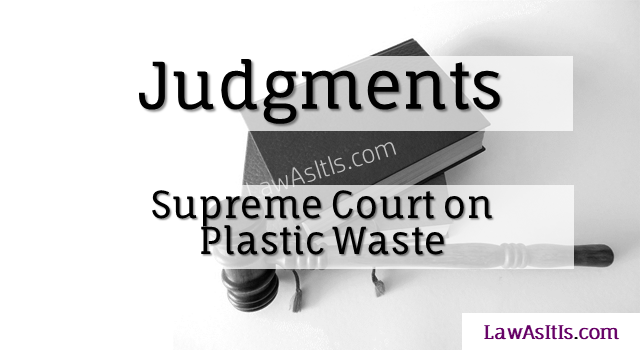Supreme Court judgments on usage and disposal of Plastic Waste, with directions to Authorities on steps to minimise its use and contamination.
1. Plastic waste destroys ecological balance
Plastic waste is a pollutant, destructor of ecological balance, and a major threat to utility of natural resources for survival of living species. Yet usage of plastic continues without much concern for environmental factors. For several product manufacturers plastic still remains the preferred packaging material, thereby increasing content of plastic waste in landfills meant for collecting a city’s garbage.
2. Supreme Court Judgments
The issue gained prominence when India’s Supreme Court pronounced strictures on use of plastic to regulate its usage and wastage. Let’s take a look at those Apex Court judgments where the Supreme Court expresses anguish and concern on growing plastic waste.

2.1 Animals suffer by consuming plastic waste
2.1.1 Karuna Society for Animals and Nature & Others vs Union of India & Others, WP(C) 154/2012
In Karuna Society for Animals and Nature & Others vs Union of India & Others, WP(C) 154/2012 Supreme Court was called upon to issue necessary directions to authorities on disposal of plastic bags and other plastic waste to prevent animals from suffering.
The petitioner submitted 6 prayers which infact hold the key to designing any waste management system –
1) Central Government should issue appropriate directions under Section 5 of the Environment (Protection) Act, 1986 prohibiting the use, sale and disposal of plastic bags in all municipalities and municipal corporations;
2) Central Government to issue appropriate directions to all State Governments and municipalities / municipal corporations to forthwith prohibit and / or to phase out in a time bound manner the “open garbage disposal “system” and to remove open garbage receptacles;
3) Central Government to issue appropriate directions to State Governments, municipal corporations and municipalities requiring them to implement door to door garbage collection and to ensure that waste storage facilities are built and managed such that animals are not allowed to move around in the vicinity of such
facilities;
4) Central Government to issue appropriate directions to State Government / Municipal Corporation and municipalities to require segregation of all plastic waste across the municipal solid waste collection and disposal chain/systems;
5) State Governments to issue appropriate directions prohibiting the use, sale and disposal of plastic bags in all municipalities and municipal corporations within their territory.
6) Central Government and other agencies to provide animal shelters, rescue homes and veterinary services for stray cattle to provide amelioration for suffering animals.
In course of proceedings the Supreme Court observed –
All our urban areas are getting choked with plastics. We must expand the scope of this petition. Until we examine the total ban on plastic and ensure the collection and disposal of all plastic, the next generation will be faced with a ticking atom bomb. 1000 million plastic bottles are manufactured every day for packaging drinking water. A photo of Yamuna in a newspaper looks like a lotus pond. In Bangalore the municipal corporation has developed a technology by using plastic for making roads.
In its judgment dated July 15th 2016 the Supreme Court said –
It is evident that the situation is very alarming but it is not for this Court to monitor the functioning of concerned authorities & local authorities to see that the areas of the local self government are not polluted. Accordingly, we direct the Union of India and the State Governments to consider the prayers in the petitions and take all necessary steps in the matter in accordance with law by constituting committees consisting of competent persons who have got sufficient knowledge on the subject matter. The Central Government may also set up an appropriate monitoring mechanism in the matter. In our considered view the respective regional Natural Green Tribunal benches can monitor and regulate the cases by passing / giving orders or directions to all the concerned statutory authorities and local self governments in the country for discharge of their constitutional and statutory duties.
2.2 Prevent usage of plastic by pilgrims (Amarnath Yatra)
2.2.1 Court on its own Motion vs Union of India, Suo Moto Writ Petition No. 284 of 2012
In Court on its own Motion vs Union of India, Suo Moto Writ Petition No. 284 of 2012, the Supreme Court was in full agreement with the recommendations of the Special High Power Committee (SHPC) on issues related to Amarnath Yatra. The judgment clearly emphasised the views of SHPC –
9.3.8 To counter the ever increasing use of plastic in the Yatra area, the SHPC recommends the following: a) The State Government should direct the concerned law enforcement agency(ies) to take all required steps, on a time bound basis, to enforce the current statutory ban on the use of plastic. b) SASB should progressively arrange facilities for drinking water filters being set up at Camps and Langar sites to discourage the use of water bottles in the Yatra area. The aim should be to provide a viable alternative to plastic water bottles in due course. The SASB could also consider introducing a "deposit amount" scheme under which the deposit is returnable when the beverage bottle is brought back to the disposal site. c) Pictorial signage (in place of the existing signage in Hindi and English) should be used at all prominent places. This would be helpful in also educating the Yatris about the need to keep the Yatra area free from plastic materials. d) The SASB should suitably revise the existing Terms and Conditions of the permissions given to Langar Organisations to ensure that that no plastic material is used for serving food and beverages to the Yatris. There should be adequate monitoring of the implementation of these conditions and all cases of non-adherence must be penalised severely.